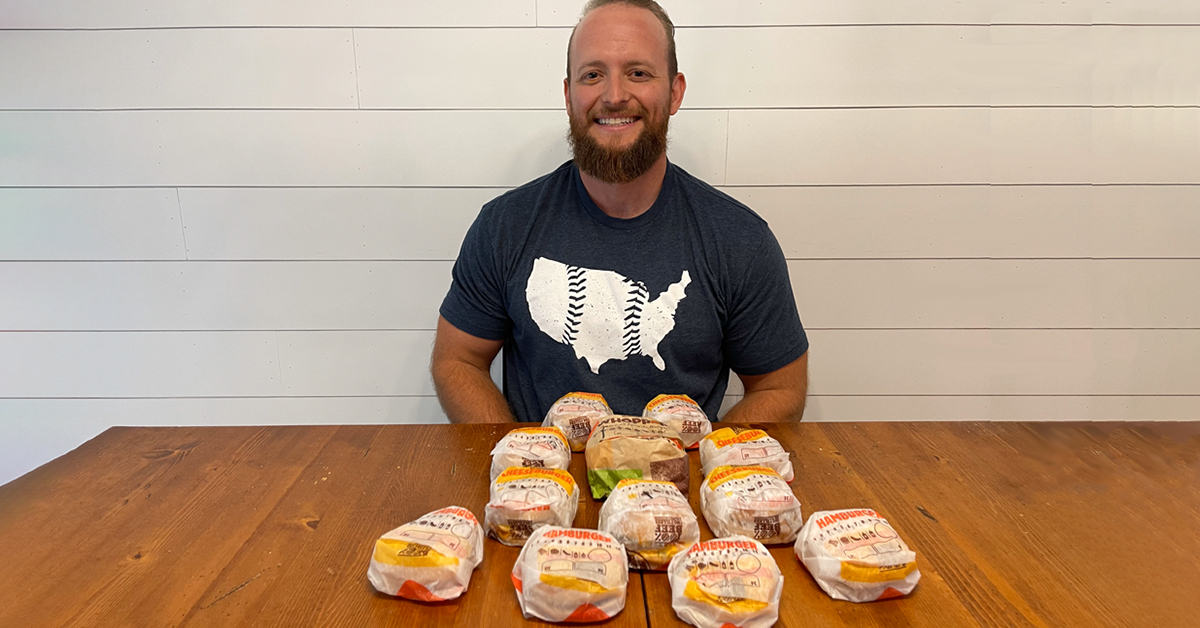Whether you’re bulking or cutting, Burger King is a great option for finding meals that fit your goals.
Below, I give you six bodybuilding-friendly Burger King meals with exact calorie and macronutrient breakdowns.
Note any customizations, like adding or subtracting ingredients, as they will make or break your meal.
New here? Hi, I’m Philip, a nutrition coach who helps you eat out while sticking to your fitness goals. If you have any questions, leave a comment at the end of the post.
Check Out Our Complete Guide On The Best Bodybuilding Fast Food
Cutting Meals
1. Bacon Double Cheeseburger (440 Calories)
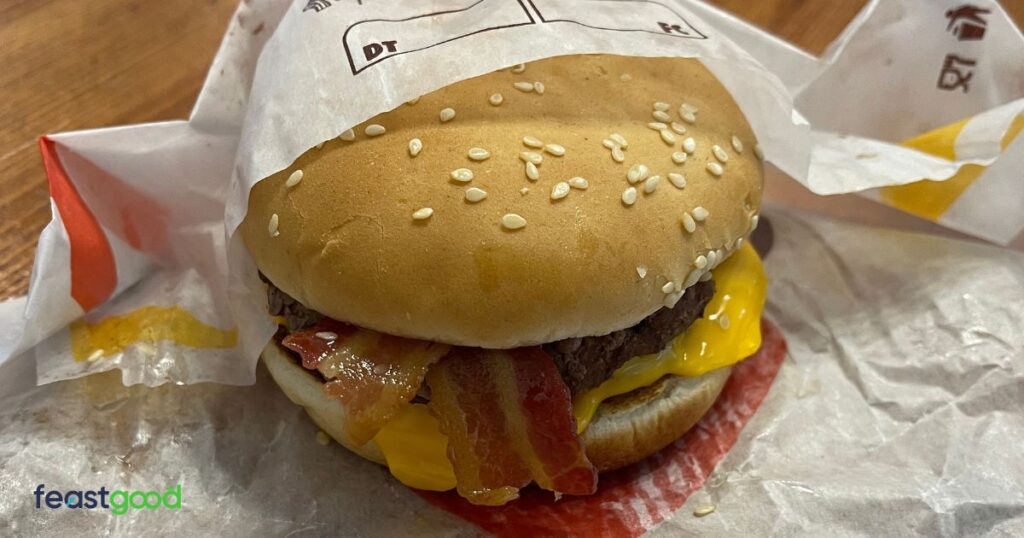
Order a bacon double cheeseburger without fries.
Nutrition:
- 439 calories
- 29 grams of protein
- 25 grams of carbohydrates
- 24 grams of fat
A bacon double cheeseburger is a good option because of the extra protein and fat from the cheese and bacon.
Both nutrients keep you full and satisfied, which is beneficial when trying to lose weight, as it helps keep hunger at bay.
Not including French fries saves 400 calories, 60 grams of carbohydrates, and 16 grams of fat.
Customizations to this meal include:
- Order the burger without bacon and cheese.
- Removing both will save you approximately 100 calories and 8 grams of fat.
2. Bacon Cheeseburger With Hamburger (590 Calories)
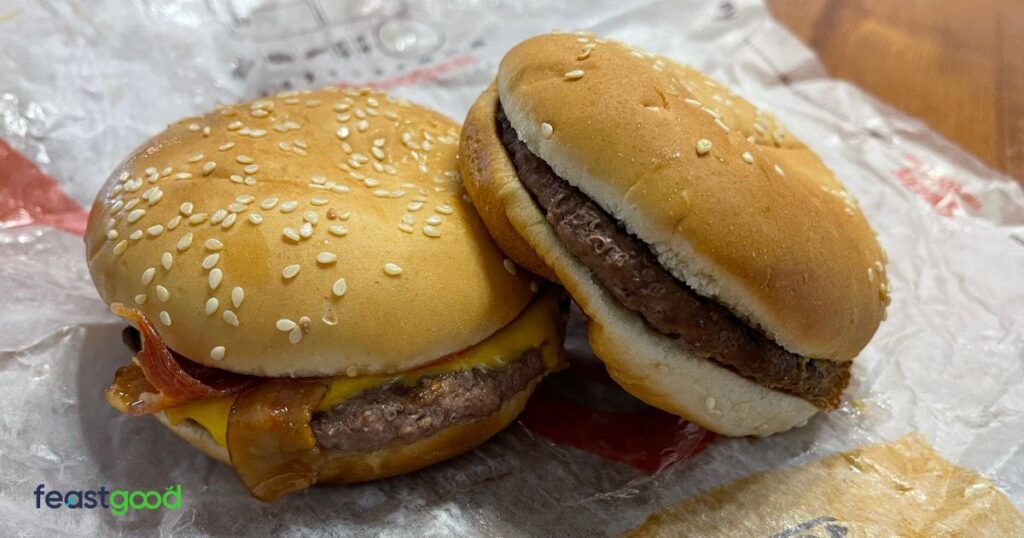
Order a bacon cheeseburger without fries and add a hamburger.
Nutrition:
- 590 calories
- 31 grams of protein
- 59 grams of carbohydrates
- 26 grams of fat
A hamburger provides an even mix of protein and fats with 29 grams of carbs.
This mix is beneficial when losing weight as the protein and fat will leave you feeling full and satisfied, while the carbs will keep you energized.
Customizations to this meal include:
- Order the burger without the bacon and cheese.
- These modifications will save you around 100 calories and 8 grams of fat.
3. Single Quarter Pound King (660 Calories)
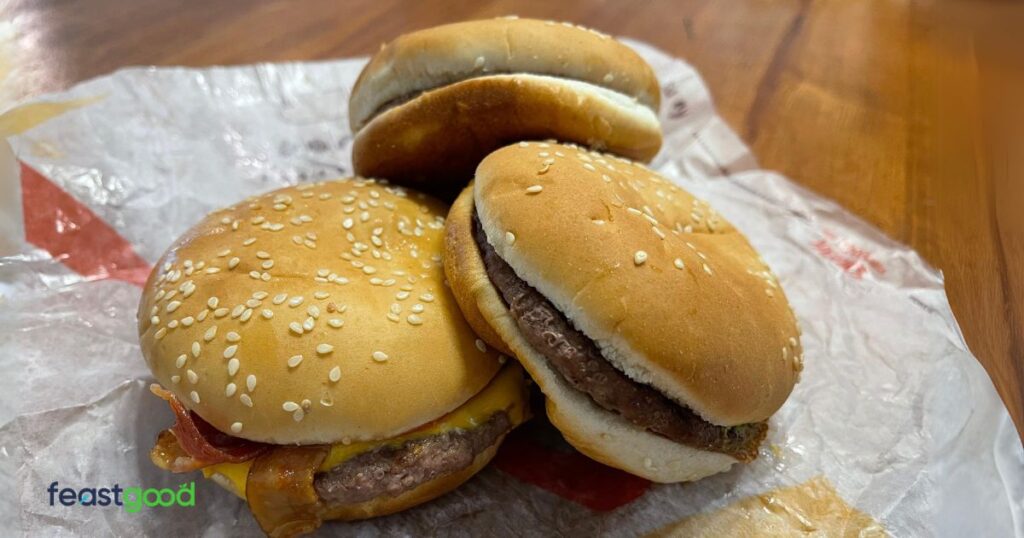
Order a single quarter-pound king without fries.
Nutrition:
- 660 calories
- 37 grams of protein
- 51 grams of carbohydrates
- 36 grams of fat
This is one of Burger King’s menu options that needs no modifications to work as a fairly high-calorie-cutting meal.
The even mix of protein and fats will help keep you full and satisfied, and the 51 grams of carbs will support your energy levels.
Customizations to this meal include:
- Ordering the burger without the cheese (saves approximately 80 calories).
Bulking Meals
1. Double Cheeseburger With Whopper Jr. Patty (770 Calories)
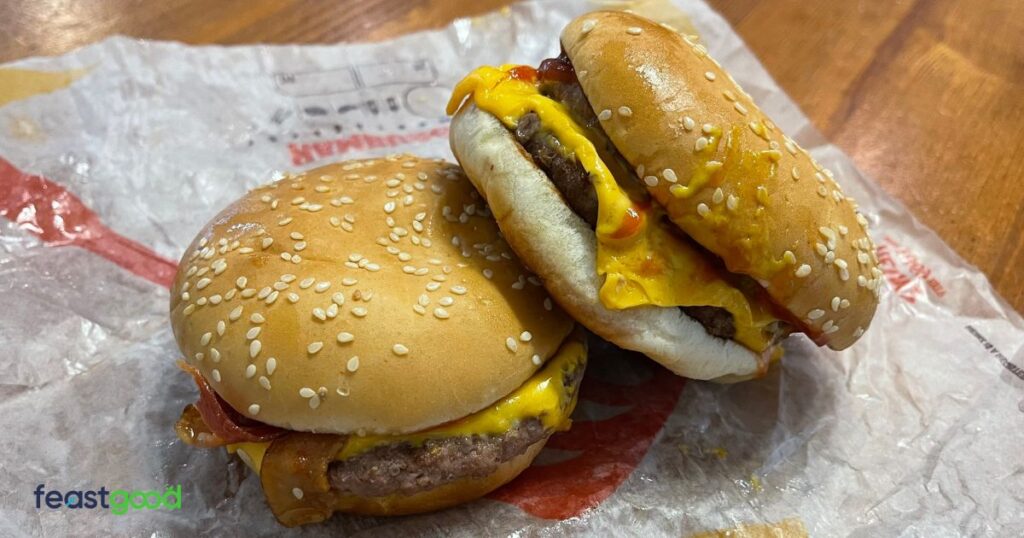
Order a double cheeseburger without french fries and add:
- Bacon
- Whopper Jr. patty
Nutrition:
- 770 calories
- 44 grams of protein
- 60 grams of carbohydrates
- 42 grams of fat
These burgers have additional cheese and bacon compared to a plain hamburger, both of which offer extra fat and protein Both are a source of fat and add additional protein.
Extra fats are beneficial because they are low in volume but high in calories, making them an excellent source of extra calories to help maintain a calorie surplus.
Also, 44 grams of protein in a single meal can help you reach your daily target more easily.
Customizations to this meal include:
- Adding a packet of mayonnaise (+80 calories).
2. Double Whopper Sandwich (920 Calories)
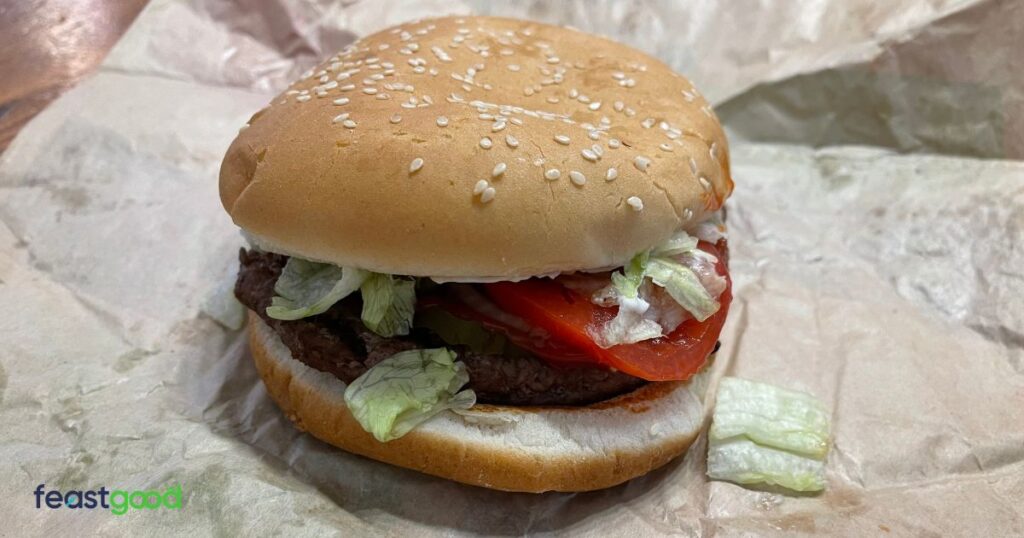
Order a double whopper sandwich without french fries.
Nutrition:
- 920 calories
- 52 grams of protein
- 54 grams of carbohydrates
- 58 grams of fat
The double whopper has a second pattie, increasing the protein in the meal by 20 grams, which is highly beneficial for muscle growth and recovery.
Customizations to this meal include:
- Add bacon and cheddar cheese to your burger.
- These will add approximately 100 calories and 8 grams of fat.
3. Two Double Bacon Cheeseburgers With Extra Hamburgers (1300 Calories)
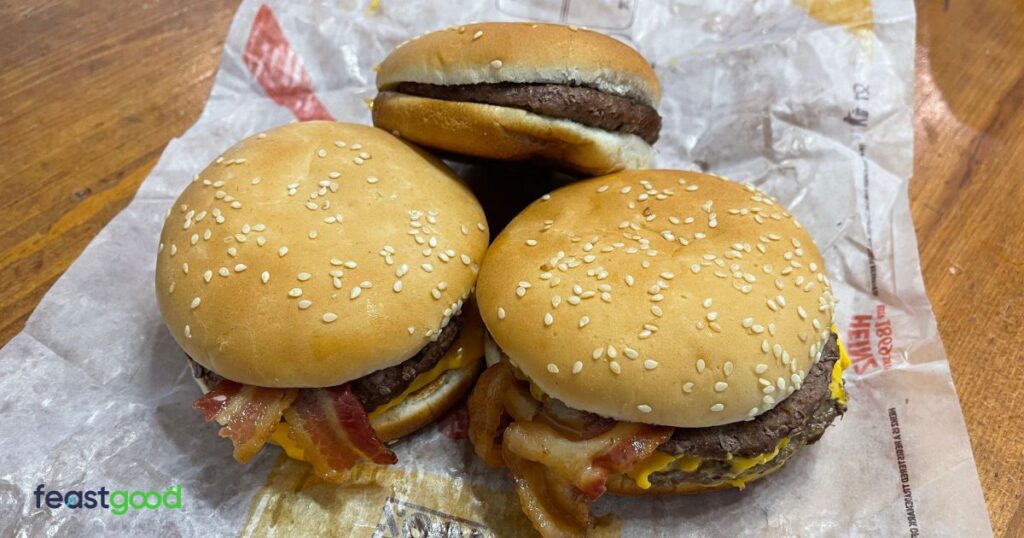
Order two double bacon cheeseburgers with an extra hamburger on each but without french fries.
Nutrition:
- 1300 calories
- 74 grams of protein
- 118 grams of carbohydrates
- 62 grams of fat
This huge bulking meal is ideal if you struggle to hit your daily calorie target. It also provides lots of protein and nearly 120 grams of carbs to fuel your gym performance.
That said, the meal contains 60+ grams of fat, which is on the high end, so limiting your fat intake in other meals is best to avoid going overboard.
Customizations to this meal include:
- Adding a packet of mayonnaise (+80 calories).
Tips for Eating at Burger King BEFORE a Workout
1. Order a sandwich
Carbs are king before training, as they provide energy to get through a hard workout.
According to the Journal of Nutrients, the ideal carb intake before training is a gram per kilogram of body weight. If someone weighs 70 kilograms (154 lbs), they should aim for up to 70 grams of carbs.
A sandwich bun at Burger King is a high-carb option ideal for pre-workout.
2. Order a meal with beef as the protein source
While protein is not as important as carbs before a workout, it is beneficial to include some to slow muscle protein breakdown during training and kickstart the repair process.
Burger King’s beef provides more protein per serving than chicken, making it the ideal meat source before a workout.
This is also a good option for a post-workout meal because getting enough protein (0.3-0.5 grams per kilogram, according to the International Society of Sports Nutrition) is highly beneficial for muscle recovery.
3. Skip the bacon, cheese and mayonnaise
Cheese, bacon, and mayonnaise are all high in fat, which digests more slowly and could lead to stomach discomfort during training. So, it’s best to avoid them and instead focus on protein and carbs.
4. Add an orange juice
Orange juice is an excellent source of fast-digesting carbs that provide almost immediate energy for your muscles. An 11.5-ounce serving has 160 calories and 37 grams of carbs.
You can also sip it during your training for extra energy because it digests easily and doesn’t cause stomach discomfort.
Tips for Eating at Burger King AFTER a Workout
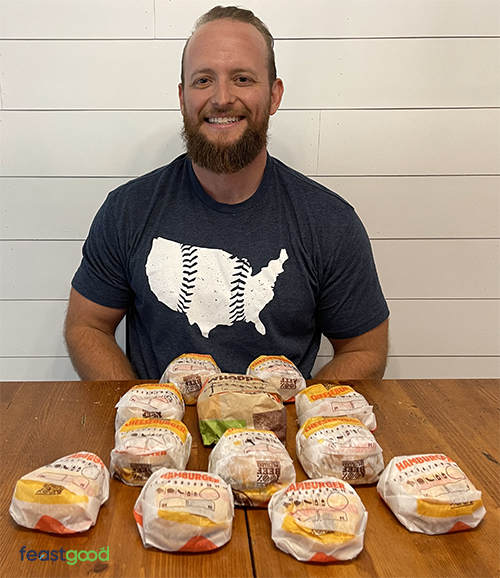
1. Get a side of fries
Getting carbs after training helps replenish lost glycogen, which positively impacts muscle protein synthesis.
According to experts, the ideal intake is 0.3 to 0.5 grams of carbs per kilogram of body weight. For example, if someone weighs 70 kilograms (154 lbs), they should aim for 21 to 35 grams of carbohydrates.
A small serving of french fries would be a good option as it offers 300 calories and 43 grams of carbs, enough to cover most people’s post-workout needs.
2. Order a meal with two beef patties
Protein is the other important macronutrient in your post-workout meal since it is what your body will use to repair your muscles.
Beef is Burger King’s highest-protein meat option, making it a great post-workout option. However, one pattie will not provide a large enough serving of protein, so including a second could be beneficial.
3. Choose between cheese, bacon, and mayonnaise
Having some cheese, bacon, or mayonnaise after training could be beneficial because these provide the energy your body needs for recovery.
However, these are also high in fats, so having all three is not ideal because they would slow digestion significantly.
Slow digestion means protein and carbs take longer to enter your bloodstream and kickstart recovery.
So, pick one of the three as an addition to your post-workout Burger King meal.
Comparing Burger King
Frequently Asked Questions
Can You Eat at Burger King and Still Lose Weight?
Yes, you can eat at Burger King and still lose weight, so long as you eat fewer calories than you burn (also known as being in a calorie deficit).
Burger King’s menu has lower-calorie options, such as hamburgers, making it easier to maintain a caloric deficit.
Can You Eat at Burger King and Still Gain Muscle?
Yes, you can eat at Burger King and still gain muscle because there are plenty of high-calorie, high-protein options to fuel yourself and maintain the necessary calorie surplus.
Burger King’s double cheeseburger provides 400 calories and 24 grams of protein per serving.
What Meal at Burger King Has the Most Protein?
The Burger King meal with the most protein is the Double Stacker King sandwich, with 1130 calories, 65 grams of protein, 55 grams of carbohydrates, and 73 grams of fat.
What Meal at Burger King Has the Most Calories?
The meal at Burger King with the most calories is the Rodeo King Sandwich, with 1300 calories, 63 grams of protein, 77 grams of carbohydrates, and 83 grams of fat.
Which Meal at Burger King Has the Least Calories
The Burger King meal with the fewest calories is the hamburger. This meal has 250 calories, 13 grams of protein, 26 grams of carbohydrates, and 10 grams of fat.
More Fast Food Meal Plans
Check out our other bulking and cutting meal plans from popular fast-food restaurants:
References
Mata, F.; Valenzuela, P.L.; Gimenez, J.; Tur, C.; Ferreria, D.; Domínguez, R.; Sanchez-Oliver, A.J.; Martínez Sanz, J.M. Carbohydrate Availability and Physical Performance: Physiological Overview and Practical Recommendations. Nutrients 2019, 11, 1084. https://doi.org/10.3390/nu11051084
Kerksick C, Harvey T, Stout J, Campbell B, Wilborn C, Kreider R, Kalman D, Ziegenfuss T, Lopez H, Landis J, Ivy JL, Antonio J. International Society of Sports Nutrition position stand: nutrient timing. J Int Soc Sports Nutr. 2008 Oct 3;5:17. doi: 10.1186/1550-2783-5-17. Erratum in: J Int Soc Sports Nutr. 2008;5:18. PMID: 18834505; PMCID: PMC2575187.
Alghannam AF, Gonzalez JT, Betts JA. Restoration of Muscle Glycogen and Functional Capacity: Role of Post-Exercise Carbohydrate and Protein Co-Ingestion. Nutrients. 2018 Feb 23;10(2):253. doi: 10.3390/nu10020253. PMID: 29473893; PMCID: PMC5852829.
Slater GJ, Dieter BP, Marsh DJ, Helms ER, Shaw G, Iraki J. Is an Energy Surplus Required to Maximize Skeletal Muscle Hypertrophy Associated With Resistance Training. Front Nutr. 2019 Aug 20;6:131. doi: 10.3389/fnut.2019.00131. PMID: 31482093; PMCID: PMC6710320.
About The Author

Philip Stefanov is a certified conditioning coach, personal trainer, and fitness instructor. With more than nine years of experience in the industry, he’s helped hundreds of clients improve their nutritional habits, become more consistent with exercise, lose weight in a sustainable way, and build muscle through strength training. He is passionate about writing and has published more than 500 articles on various topics related to healthy nutrition, dieting, calorie and macronutrient tracking, meal planning, fitness and health supplementation, best training practices, and muscle recovery.
Why Trust Our Content

On Staff at FeastGood.com, we have Registered Dietitians, coaches with PhDs in Human Nutrition, and internationally ranked athletes who contribute to our editorial process. This includes research, writing, editing, fact-checking, and product testing/reviews. At a bare minimum, all authors must be certified nutrition coaches by either the National Academy of Sports Medicine, International Sport Sciences Association, or Precision Nutrition. Learn more about our team here.
Have a Question?
If you have any questions or feedback about what you’ve read, you can reach out to us at [email protected]. We respond to every email within 1 business day.
